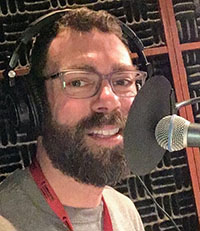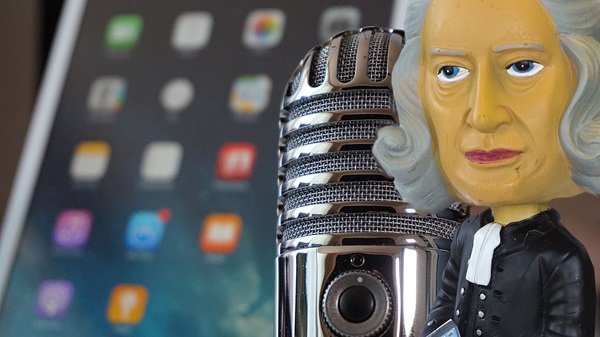John Wesley, on April 2, 1739, committed an act he previously thought vile. At 4 p.m., as weary miners began their trek home, Wesley stood roadside and began field preaching.
"I could scarce reconcile myself at first to this strange way of preaching in the fields,” he wrote, “…having been all my life — 'til very lately — so tenacious of every point relating to decency and order.”
Despite Wesley's previous practice, field preaching soon became the chief medium through which the Methodist movement spread. Wesley himself noted that he was often out and about preaching sermons at 5 a.m., reaching people headed to work.
The practice of field preaching was all about meeting people where they were.
The good news is that, much like Wesley’s field preaching, it’s relatively easy to bring our message to people where they are through podcasting. Opportunities abound for United Methodists to bring messages of hope and transformation.
Being part of the digital landscape
Today, 51% of the American population listen to podcasts, and 22% of those listen to podcasts weekly. That’s 102 million people who are, at least once a week, listening to one or more episodes of a podcast!
Try these ideas when starting to produce your own podcast.
Define your “why”
Ask yourself: Why are you interested in bringing your voice to the podcasting space, and who specifically are you trying to reach?
Wesley went roadside at 5 a.m. because he was trying to reach the Kingswood miners. In the same way, podcasts are great for reaching “niche” audiences. To be successful, be specific about who — the niche — you’re trying to reach and avoid the “everyone” pitfall.
Adam Baker — co-host of “Instructions for Living a Life” — said he and co-host Chrisie Reeves-Pendergrass “recognized how much the church tends to struggle [in]... conversations about the intersection of faith and mental health. Because of this, we’re working to create a space that normalizes and celebrates those conversations as holy and necessary.”
Their specific audience is people interested in how faith and mental health relate. The “why” of their podcast is to create a safe space for exploring mental health.
Specify your format
Will your podcast involve a co-host? Will you be conducting interviews? If so, will interview subjects join you in person, or will they be recorded remotely? Will you offer a more journalistic podcast that includes audio clips from the field?
Having ideas as to what content you want to present and in what format will help you obtain the right gear. Interview formats require equipment allowing for recording multiple inputs. Co-hosted formats require multiple microphones and, often, a means for recording from separate locations.
Get the right equipment
At its simplest, producing a podcast requires two things: a microphone and a recording device.
Samson’s Q2 or Audio-Technica’s ATR-2100 are great starter mics for podcasting. Both offer quality sound and have outputs that allow recording either on a computer (through a USB port) or a recording device (through an XLR output).
Many podcasters use their computers as recording devices. This works well for formats with a single host or remote co-hosts and guests. Dan Wunderlich, host of MyCom Church Marketing Podcast and producer of The Art of the Sermon, records his shows on GarageBand. Audacity is a free downloadable audio editing program that can also be used for audio recording.
However, utilizing an external recording device allows for more flexibility and security. Popular external recording devices include the Zoom H4N, Zoom H6 and Tascam DR-40.
I host a podcast out of my home. My “studio” setup is an ATR-2100 microphone plugged into a Zoom H4 recorder. For interviews, I connect with guests via the Skype app on my iPad and also plug the iPad into the H4 recorder. Minus my already owned iPad, I bought all my equipment used — and spent less than $200 to get my studio together.
Edit your recording
Editing recordings may be the steepest portion of the podcast production learning curve. GarageBand, Audacity and Adobe Audition are programs that work well for editing a podcast. Each will require an investment of time to learn its capabilities. However, listeners will often accept minimally edited podcasts -- if the content is good.
As a beginner, focus on creating great content. Then ease into advanced editing techniques, like removing background hiss and breaths. To begin, learn to edit out unwanted content, “dead-air” spaces and distracting sounds. It’s a good idea to run an audio compressor effect on your audio files to equalize volume levels; it’s annoying to listeners when one voice is too loud while the other is too soft. (Most audio software, including Audacity, includes compressor features.)
Intro and outro music go a long way in making a podcast sound professional. The best practice is to use licensed music. Consider using sites that offer free licensing like Incompetech and DigCCMixtr. Another alternative is Audiojungle.net that licenses music tracks for a small one-time fee.
Publish your episode
To go live with your episode, you’ll need a hosting provider. Anchor is a free hosting platform. Others include Libsyn, Transistor, Blubrry and Buzzsprout.
All of these services supply podcasters with an RSS feed that you can submit to different podcast distributors like Apple Podcasts, Google Podcasts, Spotify and Pocket Casts.
Once you’ve recorded, uploaded and submitted your podcast, it’s time to promote, promote, promote — by all the means you can, in all the ways you can, in all the places you can, at all the times you can, to all the people you can, as long as ever you can!
I think Wesley would approve!

Ryan Dunn is the producer and co-host of the Compass Podcast as well as the minister of online engagement at United Methodist Communications.

